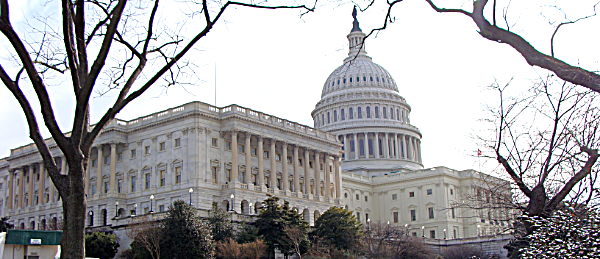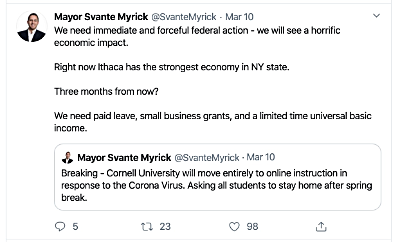- By Dan Veaner
- News
 Print
Print 
In a press call yesterday Congressman Tom Reed (R 23rd District) said that The Speaker of the House of Representatives and the White House were squabbling over partisan blame if measures taken by Washington to contain and mitigate the novel coronavirus (COVID-19) don't prove effective. But Reed was optimistic that the House would eventually focus on bipartisan legislation, and noted that $8 billion has been allotted for health care hot spots. He called for Americans to stay calm and take precautions to avoid getting the virus, but not to overreact.
"Don't lose sight of the fact that $8 billion was agreed upon in a bipartisan basis that would be delivered through our public healthcare system to the front line, to deal with this Corona virus situation," Reed said. "On top of that, uh, let's not lose sight that we are dealing with a U S economy. Uh, that is fundamentally the strongest we've ever seen in our lifetime. This is not 2008. This is not a situation where the economy is based on structural flaws in the banking system or other areas, housing markets, et cetera. This is an economy that's fundamentals are solid."
On Tuesday Ithaca Mayor Svante Myrick posted on Twitter that the city needs "immediate and forceful federal aid", and that the strongest economy in the state is at risk because of campus closures. Reed said that the federal government has to respond to the health threat first, but that it would soon take up measures to help municipalities and local businesses that stand to lose millions of dollars in goods and services sales as well as sales tax revenues.

By some estimates the Tompkins County community stands to lose over $40 million as a result of Cornell campus closing alone with about ten weeks of lost sales of local goods and services. With Ithaca College also extending its Spring Break and potentially closing its campus if the situation gets worse, the impact to local businesses and municipalities' loss of planned-for sales tax revenue could be devastating. Reed called this economic stress an unintended consequence of campus closings.
"Those, I think, are going to be appropriately addressed as we move further down the path of this crisis," Reed said. "So I see in the next two to four weeks when we put an economic package together that actually has some opportunity to come together in a bipartisan basis. Those are exactly pieces of it that we're going to be focusing on -- how to mitigate the exposures to our local municipalities as a result of this, a national emergency, and make sure that there's appropriate revenue available for folks to come out of this in a secure fashion. So I do anticipate that to occur down the road, but right now focus on public health safety... get through the immediate crisis and then the economic impacts be appropriately addressed a few weeks down the road."
Reed said that political squabbling between the The Speaker of the House of Representatives Office and the White House was delaying useful movement on passing legislation that might help the crisis. But again, he was optimistic that the House would get past politics to work on a bipartisan basis.
"The most up to date information I can give you about what is going on in the House of Representatives is we are in a wait and see mode," Reed reported. "They're supposedly talking between the Speaker's office and the white house with Steve Mnuchin. But all reports I hear is that this is a partisan based conversation. It is a lot of who's going to be blamed for not coming together in regards to dealing with this situation. We'll soon find out if any legislative action will be coming out of the House Of Representatives that could get signed into law. That being said we are part of efforts to continue to talk across the aisle with our friends in the Problem Solvers Caucus and others to see how we can best maybe put a package together that will allow us to provide relief to folks back home if a virus continues to escalate."
Reed said some decisions in Albany may be being made without considering the 'unintended consequences' such as SUNY and CUNY campus closings. He said that he respects decisions to cancel large public gatherings, but added there is no 'one size fits all' solution in such a "diverse and geographically different country". He concluded with an optimistic message:
"Make sure you're checking in with your loved ones, with your family members, make sure they're feeling well and they're getting whatever they need in order to make sure they get through this as safe and securely as possible" Reed concluded. "And I'll end with a fundamental message that I am very confident that if we stay calm, cool, and collected that we will make the appropriate decisions here in Washington. We will continue to weigh in and say this needs to be a situation where we address it like we did last week in a bipartisan non-Republican non-Democrat basis, but more as an American elected official and do whatever is necessary to get to the finish line. We will work together and to get through this crisis, focused on public health first. And then additionally down the road, I think there will come a time to talk about economics."
v16i11



